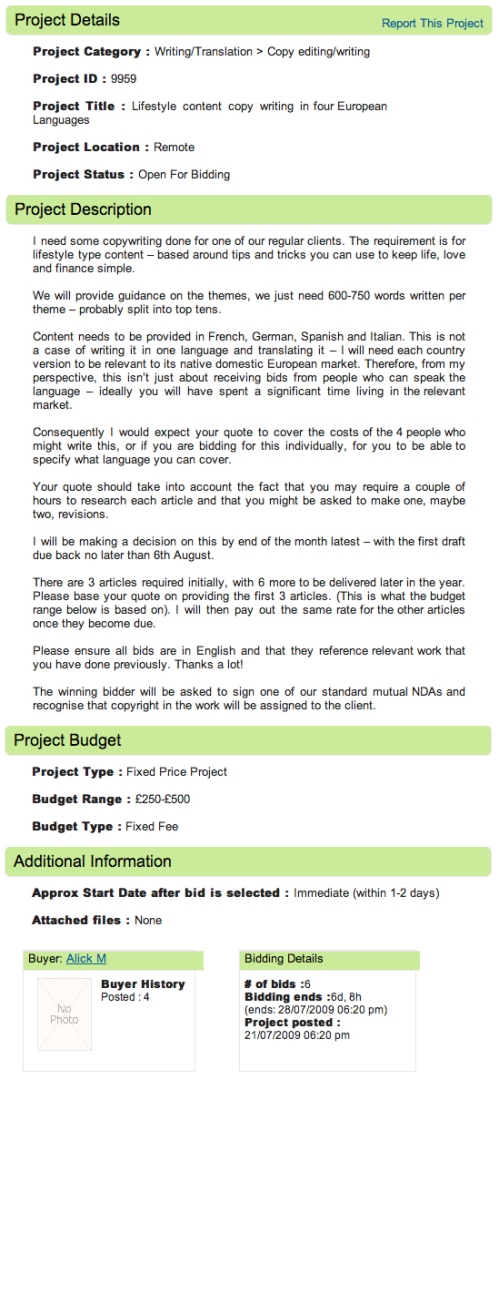Part 1; Part 2; Part 3; Part 4; Part 5;
It’s round three of media survival tips for recessionary times.
Last time, I talked about Assessing Your Skills, Learning New Skills and Updating Your CV.
Now we’re pretty much focusing on networking, networking and networking. And maybe some advertising. First, though:
Draw up a plan
Be organised. This means putting together some kind of chart to keep track of the type of work you’re hustling for, the contact details of the people you’re hustling and updates of the progress you’ve made. If you’re any kind of freelance journalist at all, you should know how useful this is to do. I use something like this – but anything that works for you is fine. The key thing is to keep track of all your contacts, when you call or email them, and when you need to follow up.

Whose names do you put on your super-organised chart? I’m glad you asked…
Talk to your friends
Mates look after mates, as someone I know wisely said about the latest recession. So the most likely source of work is either direct from people you know, or from their recommendations.
This can be a bit awkward if you’re a Brit, as we tend not to like hustling our friends. It’s a bit like going out for a drink with someone you know and then trying to sell them insurance.
Get over it. You need to pay your rent and the chances are that, if they’re in the media, they’ll understand this, and also may well need someone to do some work for them.
I picked up some corporate writing work recently, after I saw an old friend of mine after a few years. She’d moved into internal corporate communications and I asked, half-seriously, if she needed any corporate writing. The answer was yes – quite a bit of it. And that’s work I wouldn’t have come by unless I’d mentioned it. So be proactive.
The longer you’ve been in the media/journalism, the more people you’ll know in the business. Be thorough – run through everyone you’ve worked with. If they’ve moved on, that’s great, because it gives you a way into different companies. If they’ve been promoted it means they may have commissioning responsibility.
If no one has any work on offer, ask them to pass your name on to anyone they hear of who has. Remember – always ask (but don’t pester).
Contact others
Once you’ve run through your entire list of contacts, it’s time to start cold-emailing. But who to choose?
A good guide can be media job ads sites. I keep an eye on the jobs section of Journalism.co.uk, and there’s also the Guardian, obviously. (When I wrote this, I completely forgot about Press Gazette. Which may be an indication of why it’s now stopped publishing.)
You could also check out Fleet Street Blues – a journalism blog that cherry-picks journalism jobs from the web and posts them with some analysis of what they require in terms of skills, and also has some decent job hunters’ advice. They also pimp me, for some reason, which is nice.
But try to think laterally too. If you are in the market for corporate work, check out the web site of the British Association of Communicators in Business (CIB) – the professional association for corporate communications professionals – where there are a number of job listings. I’ve seen contract publishing jobs on the CIB site that haven’t been posted on other journalism job sites, for instance.
I don’t really want a job, but you can assume that if a publisher or internal communications department is hiring, it may be in the market for freelance help – especially if it’s finding it difficult to fill a position.
There’s often a few weeks’ production work on offer between the time a sub or production editor leaves and their replacement can join and get up to speed. It can work with writing too – sometimes a staff changeover can mean extra commissioning to smooth the transition.
And, yes, after that you can start trawling through general publishing company listings and sending out spec emails and CVs.
I did once buy a media yearbook with contacts for various publishing companies, but things like that date very quickly, and I found it wasn’t nearly comprehensive enough – it included almost none of the magazines I made my living from, for example.
So, use the web, and use your eyes. If a local magazine comes through your door each week or month, see who publishes it and if there’s some work there. Use Google to scour the web for publishers in different sectors. Search for your interests or specialist expertise and see who’s involved in publishing in that sector.
Draw up your list and start sending out your bespoke, tailored CVs and personalised covering letter according to whatever sector they’re in. Keep meticulous records. Note whom you sent it to and when, and keep careful track of replies. Most will be a “thanks but no thanks”, and many may not reply. Try one follow-up to them, then cross them off if they stay silent.
This kind of thing is a bit thankless and time-consuming, but can bear fruit. I contacted 14 journalism departments and training companies in the new year to try to get some teaching work. Of those, half a dozen responded with a polite “we’ll put you on file”, but two actually offered me some work – and these are organisations I’ve had nothing to do with up until now.
It tends to have best results with subbing/production shifts (a lot of production editors will try out a new sub at least once to boost their roster), less so with writing. But if you’re really stuck for work, where’s the harm? It beats daytime TV at least.
Advertise yourself
A recession is the time you actually need to spend time touting your wares most.
If you do have an online presence (and you should), make sure the address is part of your email signature.
Also consider joining the more business-focused social networking web sites. I know not everyone buys into Twitter, for example (Management Today’s editor thinks it’s “twaddle”), but enough people in the business world like it for it to be a possible route to new business.
I actually got a commission off the back of Twitter because I started following an ex-colleague, and simply managed to remind him of my existence. The investment was free in terms of money, and took very little time (once I’d figured out Twitter’s slightly minimalist instructions).
It may well also be worth spending some of your real, hard-earned money on paid advertising.
Journalism.co.uk charges £50 for a year’s listing in its freelance directory – which gives you something that looks like this. According to one freelance I know who tried it, the listing brought in enough work to pay for itself (though this was some time before the downturn).
I’m still considering doing this – but probably a bit later in the year, as I’m actually too busy right now to justify it. But £50 is just about low enough to punt in an ad just to see.
I’m also still weighing up the benefits of joining the CIB – the British Association for Communicators in Business.
As noted above, the CIB is the professional association of corporate communications professionals. It also has a directory of freelancers, but you need to be a member to join. That costs a heftier £238.50 for your first year (including a slightly irritating £60 “joining fee”) – which is a bit off-putting. But given that the hourly rate for freelance corporate writing starts at £25-£35, the work is more lucrative, so it’s worth pursuing.
Final thoughts next time, with a bit of a round-up in a final post…
Part 1; Part 2; Part 3; Part 4; Part 5;











